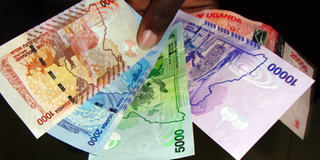Prime
Offshore investors keep Shilling afloat

These are a short-term investments sold from a few days to weeks. They’re sold at a discount to their face value in dollars, but, when T-bills mature, you redeem the full face value and pocket the difference between the amount you paid and the face value, which is the interest you earned.
What you need to know:
The shilling has registered a 0.85 percentage increment against the dollar on month to month basis of last month thanks to increased offshore investments.
Investment in government securities by foreign investors has increased by $200 million over the last 16 months due to high interest rates charged by the central bank. This means that the country has accumulated more dollars, leading to the appreciation of the shilling against the greenback, the Bank of Uganda says.
By January 2011, the total investment by offshore investors in government securities stood at $100 million compared to $150 million in January 2010. The Executive Research Functions at Bank of Uganda, Dr. Adam Mugume, says offshore investors are still actively investing in Uganda’s money market despite the high inflationary pressure the economy is experiencing.
“Currently the total investment by the offshore investors in government securities is about Shs750 billion ($300 million). This inflow has supported the shilling to appreciate against the dollar as well as accumulation of foreign exchange capital,” he said.
Dr. Mugume revealed that the total investment in government securities comprising of both local investors and the foreign investors now stands at Shs5 trillion. Over the past month, the Bank of Uganda auctioned two Treasury Bills at a face value of Shs120 billion and both were oversubscribed, attracting more than the anticipated investors.
Due to liberalisation of capital markets accounts in many countries across the globe; offshore investors are making investments outside their home countries, targeting high returns on the investments as a result of high interest rates charged on government treasury bills and bonds by the central banks.
The Bank of Uganda issues treasury bills of 91-day Treasury bill, 182-day and 364-day and treasury bonds of three, four, five and 10 years in the market on behalf of Uganda government to either inject liquidity or mop up excess liquidity in the market.
Average yields on the 91-day treasury bill, 182-day and 364-day edged up to 18.1 per cent, 19 per cent and 20.3 per cent from 17.3 per cent, 19.1 per cent and 19.4 per cent in March.
Dr. Mugume further pointed out that given maturities; net withdrawal by the central bank was Shs57.9 billion while at the same time it issued a new three year treasury bond with a face value of Shs100 billion at a cost of Shs87.9 billion and it was oversubscribed by Shs157.3 billion.
The central bank says that yields of the three year Treasury bond issued in January 2012 fell to 15.4 per cent from 21.1 per cent, while the net impact of Treasury bond withdrawals by the central bank was Shs3.3 billion.
Recently, the Chief Executive Officer of Crested Stocks and Securities, Mr Robert B. Baldwin told Prosper that lately, there has been increased interest by the retail investors in the government securities. “This development is encouraging quite a good market for development,” he said.
While there has been increased investment by offshore investors in the fixed income segment in Uganda’s domestic money market, investment in the equity segment has been weakened leading to low trade volumes. This is because the funds that would have been invested in equity market are being diverted to the fixed income segment like treasury bills and treasury bonds.




